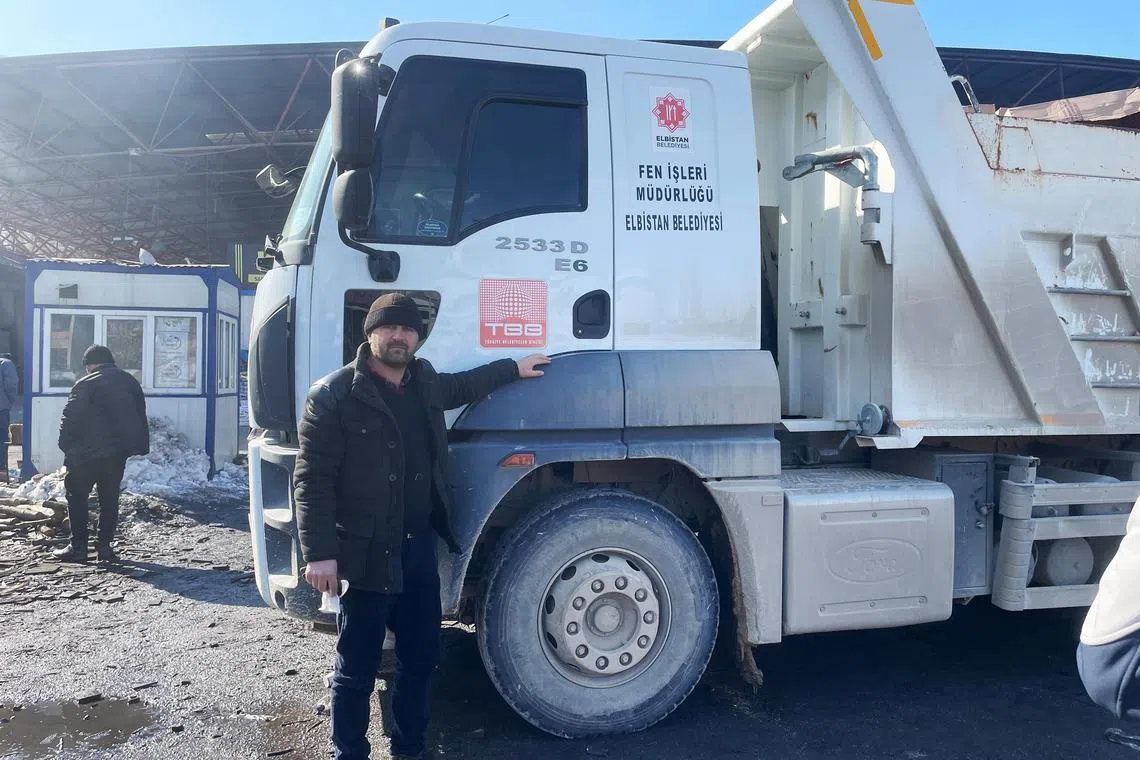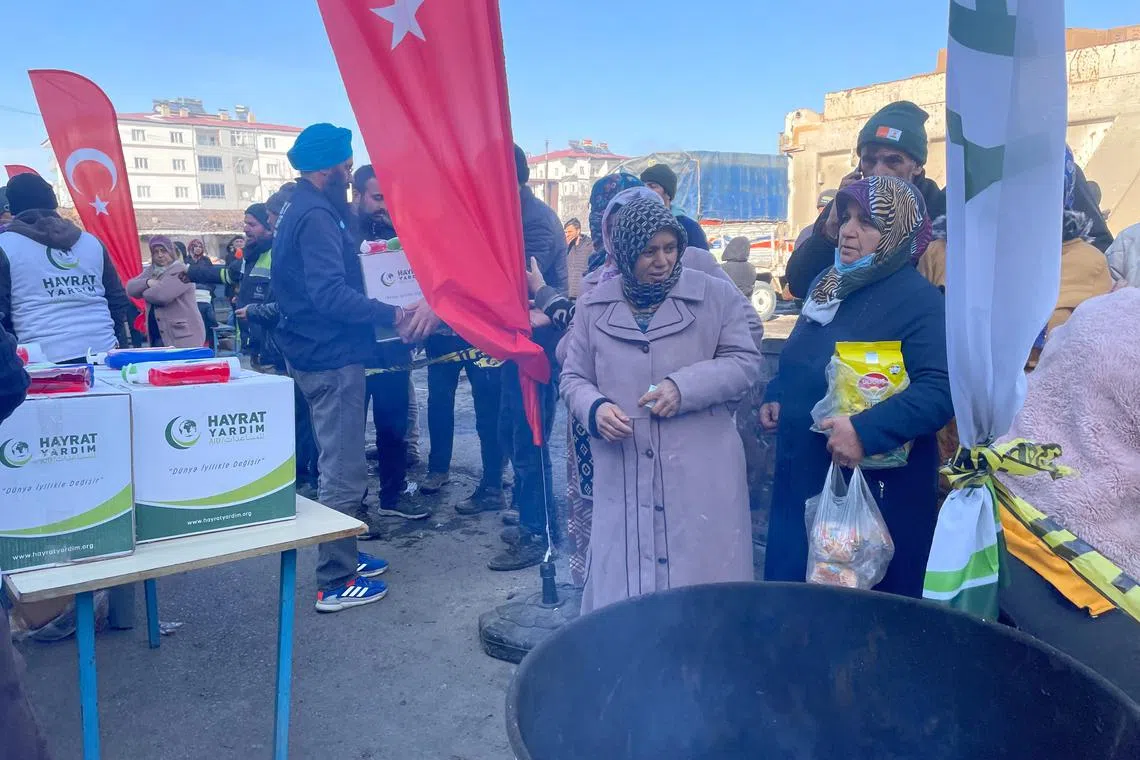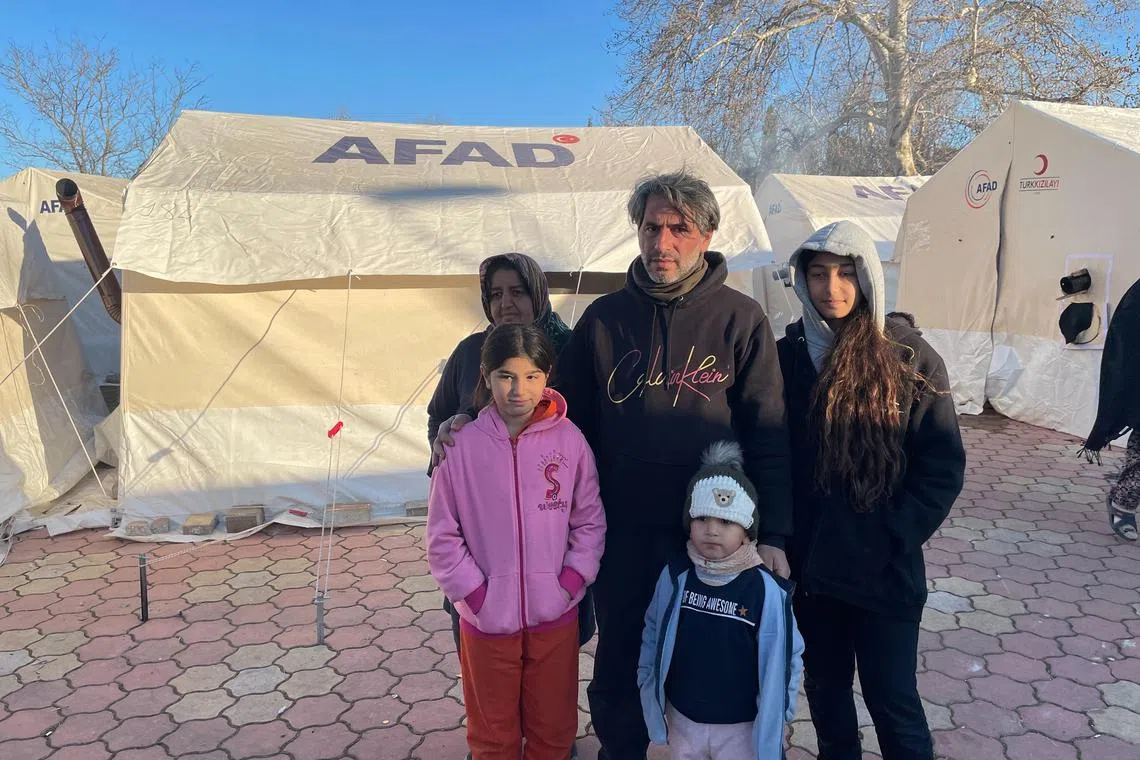Turkey quake survivor: I’m alive, I should help others
Sign up now: Get ST's newsletters delivered to your inbox

Mr Kazim Erdogan with the truck he uses to deliver items such as stoves for the needy, despite having lost family members in the earthquake.
ST PHOTO: SAMUEL DEVARAJ
KAHRAMANMARAS, Turkey – Despite losing relatives, including two brothers-in-law, in the earthquake that nearly destroyed his hometown in Turkey, Mr Kazim Erdogan has gone straight to helping his neighbours.
A driver by trade, the 40-year-old is helping to deliver necessities, such as stoves and warm clothing, to fellow residents in the district of Elbistan in Kahramanmaras. In the district alone, where there are about 80,000 people, over 1,000 buildings are damaged.
The 7.8-magnitude quake that happened on Feb 6
Speaking to The Straits Times on Friday after dropping off a batch of stoves at a distribution centre in the city, Mr Kazim said he, his wife and three children – aged 10, 12 and 13 – have had to stay with 13 other relatives in two tents following the quake.
Said Mr Kazim: “It was a very, very bad situation for us, and our district was almost destroyed. There were many people who died in this district, but I’m alive. And since I’m alive, I should help the people in my hometown.”
Mr Kazim is a volunteer with Turkey-based aid organisation Hayrat Aid.
Singapore non-governmental organisation Mercy Relief is working with it to help survivors across the country.
Mercy Relief chairman Satwant Singh arrived in Turkey on Wednesday with three colleagues, and they have visited some of the stricken areas.
ST is accompanying Mercy Relief on the trip.
The organisation, which provides aid to affected communities, has collected over $180,000 from donors in Singapore.
Through Hayrat Aid, Mercy Relief has bought warm clothing and blankets that are being distributed to survivors.

Women waiting to receive supplies at a distribution centre.
ST PHOTO: SAMUEL DEVARAJ
Assessing the damage in the region, where the weather is 14 deg C on average but can drop to minus 4 deg C at night in places like Elbistan, Mr Singh told ST the situation is severe.
He said: “People are out in the streets, out in tents and they need a lot of help. And to compound this misery, it is winter – it is cold and they need food, shelter and clothing.
“Because we have done other earthquake projects, I know it is going to take a long, long time for the people here to redevelop the area and reconstruct the buildings. Most of the buildings you see have crack lines and they are definitely not safe to stay in.”

Mercy Relief chairman Satwant Singh (centre) helping out at a food truck in Elbistan, Kahramanmaras.
ST PHOTO: SAMUEL DEVARAJ
It will take more than a year for the country – which has a population of 85 million – to come to terms with the tragedy, said Mr Hasan Abut, an international coordinator at Hayrat Aid.
“Everyone in the country knows at least one person affected by the earthquake,” he said.
The 26-year-old said his uncle, who is from the city of Antakya, had a close brush with death as a result of the earthquake but escaped unharmed, though his house is badly damaged.
Mercy Relief board member Mejar Singh Gill, who is also in Turkey, recalled seeing a group of women rushing towards blankets at a distribution centre as soon as they saw the items, without joining the queue. He said: “You could see the desperation in their eyes.”
It was a heartrending moment, he added.
Despite the overall situation, Mr Mejar Singh is impressed by the response of the country in the first two weeks after the disaster.
Having had experience in the Ministry of Foreign Affairs, handling mainly consular matters for over 20 years, the 73-year-old retiree has dealt with the aftermath of the tsunami in 2004 in Aceh, Indonesia, and the bombings in Bali two years before that.
“Here, I noticed, there’s plenty of transport and many excavators. Hot food is available – there are many volunteers. The supply lines also appear to be functioning well,” he said.
“The disaster is enormous and Turkey won’t be able to handle it on its own. But at least the initial response, within a short time, has been good.”
In the city centre in Kahramanmaras, most of the buildings that remain standing have been abandoned as several residents, including chef Juma Bozoglu, have been displaced to tents.

Mr Juma Bozoglu, his wife and three of his four children, who are living in a tent in Kahramanmaras after the earthquake rendered his home unliveable.
ST PHOTO: SAMUEL DEVARAJ
Mr Juma, 42, his wife and three of his children who are living in a tent provided by aid organisations, stayed in his car for about four days after the earthquake hit. His fourth child is living in a tent some distance away.
He said: “There is a reason for everything and we accept all of the things from God without any question.”
Correction note: An earlier version of this article stated that the population of Elbistan was around 8,000. It should have been around 80,000. We are sorry for the error.



